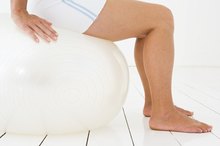Holding in Your Pee Is Now a Trend: Here's Why It's Dangerous
We’ve all been there: stuck in traffic, fighting an intense need to pee (like, ASAP). Not a pleasant feeling, right? Well, it turns out that holding in pee is the newest trend. In an attempt to prompt a “peegasm” — an intense, physical feeling of relief that happens when someone goes “number one” after holding it in for an extended period — women are intentionally holding in their pee. Ladies, beware. This is one very dangerous trend that can cause permanent damage to your nether region.
So how did the “peegasm” trend come about? One Reddit user started a thread about this phenomenon, writing: “So my girlfriend recently told me if she’s had to hold her pee in for a while, when she actually goes to pee, she often has orgasms that she feels all the way up her spine to her head.”
“If she does ‘reverse kegels’ while peeing, they’re even more likely to happen,” the curious poster continues. “She said these orgasms sometimes leave her lightheaded and off balance and are pretty different from her clit or vaginal orgasms.”
A few Redditors responded, detailing their own peegasm experiences. “It feels like a sensational whole-body massage,” one user wrote.
Another said, “I don’t try for them often, they mostly come on accident, but a beautiful accident at that.”
Dr. Jamin Brahmbhatt, managing director of the Personalized Urology and Robotics Clinic at South Lake Hospital and Orlando Health, tells LIVESTRONG.COM that trying to achieve a peegasm comes with several serious health risks. For one thing, he says, holding in your pee can cause it to back up into your kidneys, causing kidney dysfunction.
It can also cause your bladder to stretch out and lose its ability to completely empty, “kind of like a balloon,” he says.
Plus, there’s the potential that your bladder could rupture. “I’ve actually seen some of the bad things that can happen when people have full bladders and they get into trauma like car accidents, the bladder can actually burst,” Dr. Brahmbhatt explains.
Lastly, constantly holding in your pee can cause bacteria to build up in your bladder, increasing your likelihood of developing a recurrent urinary tract infection (UTI). Need we say more?
While it’s definitely inadvisable to hold your pee in for the sake of a peegasm, there is a scientific explanation as to why having to go might cause sexual pleasure. Many of the same pelvic muscles that are used during sex contract when you’re trying to keep from peeing, according to Dr. Brahmbhatt. And, as they do during an orgasm, those muscles simultaneously relax when you release your urine, causing a euphoric feeling.
Nevertheless, the risks of this bizarre trend outweigh the rewards. “There are so many cons of doing this that I would say: Find another way to seek sexual pleasure,” Dr. Brahmbatt advises, adding: “Because there are a million other ways out there that are safer.”
What Do YOU Think?
What are your thoughts on this dangerous trend? Have you ever experienced a peegasm? Share your thoughts in the comments section!
Related Articles
Writer Bio
Cathleen Krueger is a freelance writer who specializes in health, wellness, celebrity, entertainment, tech and gaming.







